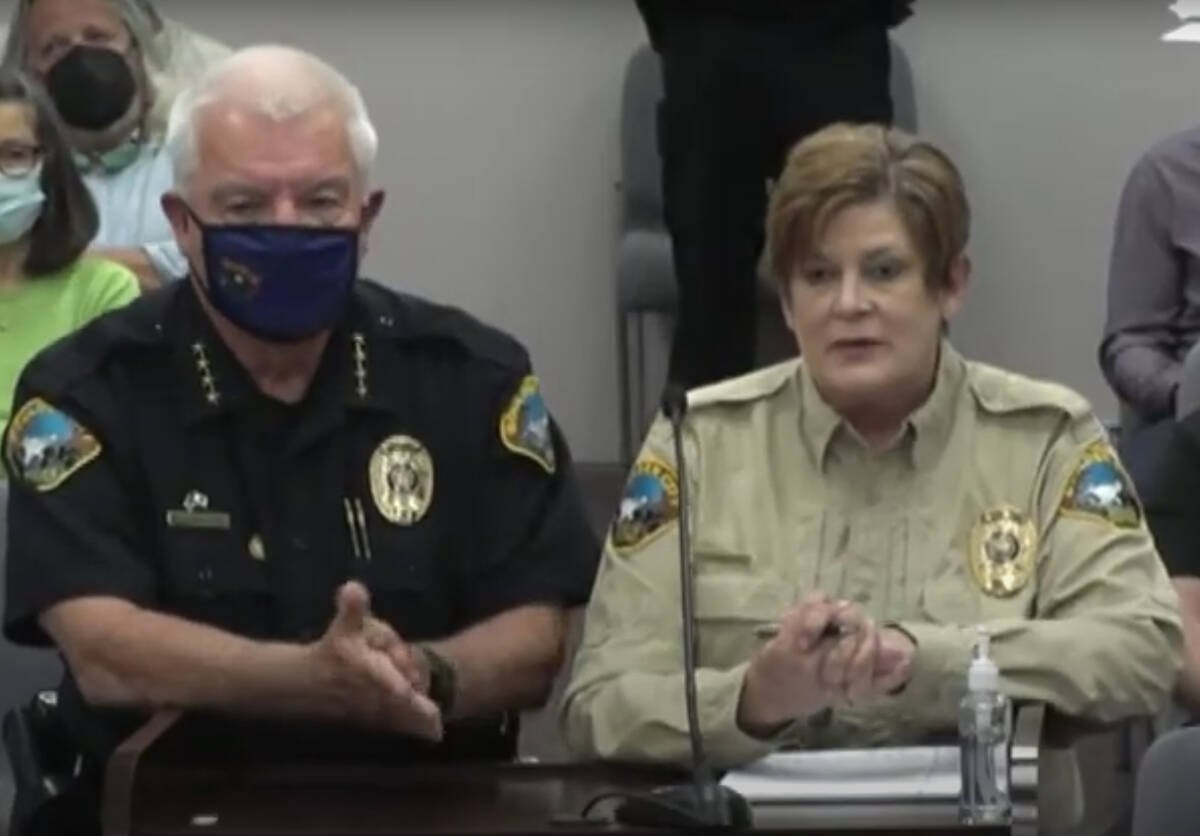To chip or not to chip is still the question
Boulder City’s leash law and the controversy over the potential for permitted pet breeding within city limits were not the only animal-oriented items on the city council’s agenda for last week’s meeting.
Licensing and microchipping were also up for (very long) discussions as was some clarification on if the shelter is or is not fully funded by the city.
Licensing
Calling the current process for licensing wonky is likely an understatement.
Up until about a year ago, the entire process was done by hand. Last year’s budget allowed for the city to license a software package called Shelter Pro, which allows animal control staff to look up licensing information and track things like number of calls for which issues over specific time periods. But most of the process is still done by hand and the info is only entered into Shelter Pro at the end.
Plus, getting a license or renewing one means making a trip to the shelter. There is not, according to Police Chief Tim Shea in his presentation to the council, an option to apply or pay online. However, for a relatively small cost, the city could license a second module in Shelter Pro that would add an online portal that would allow BC residents to apply and pay for both new and renewal licenses online.
The current cost for the bare-bones version of Shelter Pro is $2,562 per year. The additional module would cost the city $1,300 per year. But total costs would be quite a bit higher. Why? Currently the shelter has no clerical support at all. Shea explained that some years ago there were two part-time secretaries working for the PD and one of them was able to provide some support to the shelter but, he added, one of those two positions had been eliminated several years ago.
Adding a part-time clerical position would add about $22,000 to the total cost.
However, Shea noted that there are currently only about 400 licensed pets in Boulder City and that is a fraction of the actual total number. He said that going to an online system and eliminating the need for a trip to the shelter might increase the number of licenses significantly which would help cover some of the costs.
The licensing portion of the meeting was just a presentation and no action was taken.
Microchipping
The direction being sought by city was if the council wants to change the current law, which says that pets must either be microchipped or wear an ID tag at the owner’s discretion. The other options presented were to 1) Require all pets to be microchipped or 2) Require that, if a pet ends up in the shelter, having a chip implanted was one of the terms for its release.
There was a significant amount of confusion about what any of that even meant but it came because of an unexpected change of heart by one council member.
In past conversations, Councilman Steve Walton has expressed a reluctance to “over-regulate” and did not support mandatory microchipping. But, citing the well-publicized overcrowding at the shelter, he said he had changed his mind.
“I think we then talk about microchipping, what’s the bottom line, right?” he asked. “I’m coming to the conclusion that the bottom line is to make sure we get pets back to owners and to keep them out of the shelter, right, and to not contribute to the additional overpopulation of our shelter.”
Walton continued, saying, “Just using myself as an example, if one of my dogs were somehow to get lost and picked up and taken the animal shelter, I’d want either one of them back like now. I would not want them to be in the shelter to overpopulate the kennels that are already overloaded.”
Walton gave a nod to both concerns about cost and over-regulation and said that he hoped the donations the shelter gets might help with cost issues but that in a comparison between the cons of too much regulation and the pros of keeping animals out of the shelter he was going to come down on the side of addressing overcrowding.
“I can support microchipping all of our domesticated animals for those bottom-line reasons,” he said. “Really, the bottom line, the real issue, is keeping those pets out of our shelter and returning them to the owners ASAP. Is that over-regulating? I don’t know. But I’m OK going with that balance because of the conditions in our shelter and I’m so grateful for the leadership that has created a non-kill shelter, a humane shelter, a place where proactive things are done for the health of the animals and that microchipping requirement just may contribute to that benefit as well. So, that’s my two cents.”
At least two members of the council, Mayor Pro Tempore Sherri Jorgensen and Councilwoman Cokie Booth appeared caught off guard as both had cited Walton’s previous stance in their own comments saying that they did not think the current law should change.
It was evident from earlier parts of the discussion that the council really needed its subject matter expert, Animal Control Supervisor Ann Inabnitt there to answer questions, but she had “not been invited to speak or attend.”
Jorgensen asked if rabies certification and owner ID could be on one tag and City Attorney Brittany Walker said she thought that was possible.
Actually, the rabies tag is issued by the county and it only has a number and can’t be altered. Owner ID would have to be on a second tag.
In a similar revelation of senior staff and the council not really being familiar with the realities, Jorgensen passionately spoke about how requiring microchipping might make adoption too expensive.
The reality, according to Shea, license fees in Boulder City are $4 per year. Adoption fees are $8 and any animal adopted has been vaccinated, spayed or neutered and microchipped.
“In my previous jurisdiction, the adoption fee was $375. It was a very difficult process and we did not adopt many animals out. It is not the way I would have liked to see it done but that is what the county did,” Shea said.
In the end, the council instructed Walker to come back with text changes that would, at minimum, require a microchip as a requirement for getting an animal out of the shelter and, in addition, to bring back information from the county regarding their experience with requiring mandatory microchipping for all dogs and cats.
Donations
“I can’t tell you how much I appreciate the goodwill we see here. I had an animal control operation when I worked for a sheriff’s department, we saw nothing remotely like this,” Shea said in discussing the substantial monetary and in-kind donations made to the shelter.
He showed pictures of shelves full of food and supplies that had been donated by the community and explained that the fact that so much is donated had led to an impression among many in the community that the shelter was not fully funded.
“It isn’t underfunded for the basics,” Shea explained. “It would be underfunded for all of the extras that we do that other shelters can’t do and that’s really what the donations do. I’ve also had to discourage some of our own folks from putting their own money in so we could actually determine what in the world this really costs us.”
Shea said figuring out the budget is largely a case of being flexible.
“I’ve been trying to be very judicious and careful and not break the bank and you know, cry wolf,” he said. “If I’ve ever needed money for anything I can come before this body and say here’s what happened, we need to have a budget amendment to do this and there’s no doubt in my mind that would happen. None at all. I’ve just not had to do it yet. I’ve been able to move money when I needed to from other places.”
But that may not always be the case. Shea used medical expenses as an example.
“We’ve had an exceptional year this year, so far, for medical bills and I’ve just moved some money from donated funds into professional to take care of medical bills going forward for this year,” he said. “But we’ve already spent our budget. When I started, it was $5,000 for medical. Our budget now is $40,000. Now $40,000 is probably a little bit light
Shea said he saw donations as a way to provide things that are not in the budget.
“I don’t want to rely on donations for things that we have to do,” he said. “I want to use donations for the things that are above that and so far we’ve been fairly successful at that.”















